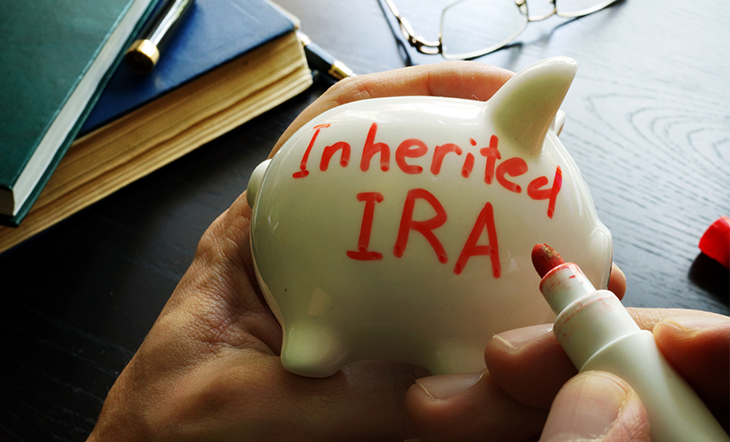Here’s All You Need to Know About Inherited IRAs

40 years ago, when Individual Retirement Accounts or IRAs were rolled in motion as a vehicle of retirement savings, no one saw the generational turn investors would take. Since then, IRAs have become a popular investment tool. While opening an IRA, account holders generally have to name a beneficiary. These beneficiaries get precedence over anyone else who is named in the account holder’s will or trust. When the owner of an IRA passes away, beneficiaries need to immediately put forth their claims. Usually, there is a smooth system for taking care of the entire process, but with estate and income tax implications, it can sometimes be a confusing process.
Here is everything you need to know about an inherited IRA.
Table of Contents
What is an Inherited IRA?
To understand an inherited IRA, you must first know what IRA stands for. An IRA is an individual retirement account that provides tax benefits in exchange for retirement savings. There are several types of IRAs, mostly differing in terms of tax penalties and required minimum distributions (RMD). Here are some examples:
- Traditional IRA
- Roth IRA
- SEP IRA
- Non-deductible IRA
- Simple IRA
- Conduit IRA
- Rollover IRA
An inherited IRA is an account that is opened by a beneficiary or individual when he inherits an IRA from the owner of the IRA after their death. The type of IRA the individual inherits depends on the type of IRA the owner held. The inheritor can be a spouse, relative, friend, or entity like an estate or trust.
Factors affecting inherited IRAs
Several factors can affect inherited IRAs. The rules for spousal and non spousal inheritance also differ. Inheritors are also concerned about the RMD – the amount that they are supposed to withdraw annually from the IRA as per the U.S. tax laws. Here are some important factors to consider when inheriting an IRA:
1. Account type
The type of IRA inherited, is a key factor influencing RMDs. Generally, the number of withdrawals or distributions by the beneficiary from the IRA account leads to the payment of taxes. When you inherit an IRA, you must take distributions during your lifetime or within five years after the death of the original account holder.
2. Age of the account holder
The age of the account holder can influence RMD returns. It also decides the percentage of potential penalties and other aspects of inherited IRAs. For instance, whether or not the account holder dies before or after 70½ will have RMD implications for beneficiaries. The same goes for age 59½. If the inheritor seeks to withdraw any of the funds before reaching the specified age of a withdrawal, a penalty is likely to be applied.
3. Relationship between the account holder and the inheritor
The relationship between the account holder and the inheritor is the most important factor influencing the distributions of an inherited IRA. Different rules apply to spouses, non-spouses, and entities, as discussed below.
IRA rules for spouses
Spouses have flexible options and can decide the way they want to handle an inherited IRA. If you inherit a deceased spouse’s IRA, you can either roll over the IRA to your own account or inherit it as it is. You can also create a separate account and transfer the assets of the original IRA. You can opt for a lump-sum distribution or decide not to take ownership of the IRA at all.
As a rollover, the company either directly transfers the money to your existing IRA account or sends you a check that you must deposit to your IRA within 60 days.
If you wish to inherit the IRA, you are required to withdraw RMDs if your deceased spouse was 70 ½ or older. If not, then you must wait till the year your spouse would have turned 70 ½. For example, if your spouse dies at the age of 65, you must wait another 5 ½ years to start your RMD withdrawals.
IRA rules for non-spouses
If you are a non-spouse beneficiary, you will not be able to treat the inherited IRA as your own. You cannot make any additional contributions or rollover any new amounts in or out of the inherited IRA. However, the IRS allows transferring the IRA to another firm via a trustee-to-trustee transfer. The RMDs for non-spouses have higher tax implications. You can opt for a lump-sum distribution or decide not to take ownership of all or any part of the IRA by disclaiming or renouncing the inheritance.
Steps you need to take as a Beneficiary
For the ownership and the transition process to run smoothly you need to follow the steps below:
Step 1
Notify the account holder’s brokerage firm of their death within a reasonable amount of time. The sooner the intimation, the better it is. Upon notification, the brokerage firm sets in motion a quick process that starts with the beneficiary filling a beneficiary claim form.
Step 2
Collect and keep all the required documents ready, in the manner asked to be provided by the brokerage firm. Discuss document related queries with the firm well in time and get all your questions clarified so that you do not lose your precious time later.
Step 3
Understand the ownership that you are getting into. Take time to understand the IRA assets, your investment holdings and determine whether they work for you in the long run. Assess the risk and restrictions in each investment.
Step 4
Weigh the pros and cons of investing and selling assets within the IRA. If you plan to do so, there can be coincidental costs attached to a sale. Consider consulting a professional for guidance. An advisor will help you assess if the broker and brokerage firm are suitable for you. You are not compelled to stay with the account holder’s brokerage firm.
To sum it up
Although the tax implications of each inherited IRA can be complex, the actual transition of IRA assets is a smooth process. This is because designating a beneficiary is a common practice amongst retirement plans, especially in IRAs and the account holder is aware that the beneficiary will take precedence over anyone mentioned in their will or trust.
If you still have questions about IRAs, you can consult financial advisors for help.
A team of dedicated writers, editors and finance specialists sharing their insights, expertise and industry knowledge to help individuals live their best financial life and reach their personal financial goals. We believe that there is no place for fear in anyone's financial future and that each individual should have easy access to credible financial advice.
Related Article
10 min read
10 Nov 2025
What to Do If You Are 50+ With Over $2 Million in Your 401(k)
A sum of $2 million in a 401(k) is a pretty good figure. To put it in perspective, if you think about how many 401(k) balances are over 2 million, there aren’t quite that many. Reports show that the average balance for people in their 50s ranges from about $199,900 to $592,285. That means someone […]
10 min read
26 Sep 2025
The Hidden Cost of Rolling Over Your 401(k) to an IRA
Every time you consider moving your retirement savings from your old employer’s 401(k) into an Individual Retirement Account (IRA), you hear that it’s simple, smart, and often more flexible. You gain more control over which instruments you can invest in and eliminate the hassle of juggling multiple accounts. But there’s a catch. Beneath that smooth […]
9 min read
17 Sep 2025
How to craft the perfect financial plan for short, medium and long term goals
Financial planning is not a singular decision; it’s a series of well-timed, interconnected moves. Each move serves a different purpose, yet all must align with one overarching objective: securing your future on your terms. Short, medium, and long-term financial goals are the scaffolding for that future. They dictate how you allocate resources, manage risk, and […]
12 min read
05 Aug 2025
Deciding What to Do with Your 401(k) Plan When You Change Jobs
Changing jobs is often a moment of optimism and renewed purpose. New responsibilities. Better compensation. Maybe even a new city. But amid the excitement of offer letters and onboarding checklists, there’s one often-overlooked question that can quietly shape your retirement future: What happens to your 401(k) when you change jobs? You’ve spent years contributing, watching […]
More From Author
14 min read
23 Jan 2024
How to Determine If Your Financial Advisor Is Doing a Good Job Each Year
The decision to hire a financial advisor is a prudent move. Seeking professional advice can provide valuable insights and a roadmap to achieve your financial goals with strategic planning. But the world of financial advice is crowded. While some advisors bring qualifications, expertise, and a commitment to your financial well-being, others may fall short of […]
4 min read
30 Oct 2023
How to prepare for a meeting with your Financial Advisor
What do you do before you visit a doctor? Understand your condition, prepare for all the questions that the doctor would ask, ensure all your test reports and medical history documents are in order and so on. Preparation is a must even before you visit a financial advisor. Table of Contents7 Things to do to […]
3 min read
26 Jul 2019
Best Retirement Calculators to plan Retirement
It is said that a goal without a plan is just a wish. This holds true even for retirement planning. You dream of a peaceful retired life. To achieve that you must plan for your golden years well in time. Various retirement tools make your task easier. For example, a retirement calculator helps you calculate […]
4 min read
23 Mar 2020
How to get rid of Money Anxiety?
Is money anxiety even a thing? Yes, it is! Money anxiety is something we all have dealt with or are likely to deal with at some point in our life. Sometimes, you may not even know that you are money anxious unless you take note of it. But the good part here is that money […]
Find & Compare Top Financial
Advisors in your area
Get Started
Popular Posts
Categories
- Business Finance (2)
- Education Planning (31)
- Estate Planning (31)
- Financial Advisor (1)
- Financial Advisor Guide (55)
- Financial Planning (138)
- Investment Management (99)
- Personal Finance (15)
- Portfolio Management (1)
- Retirement (28)
- Retirement Healthcare (1)
- Retirement Planning (111)
- Retirement Plans (1)
- Uncategorized (2)
Subscribe to our
newsletter & get helpful
financial tips.
The blog articles on this website are provided for general educational and informational purposes only, and no content included is intended to be used as financial or legal advice. A professional financial advisor should be consulted prior to making any investment decisions. Each person’s financial situation is unique, and your advisor would be able to provide you with the financial information and advice related to your financial situation.



